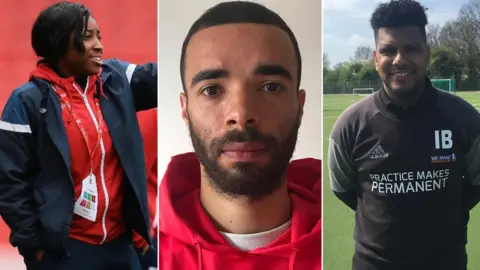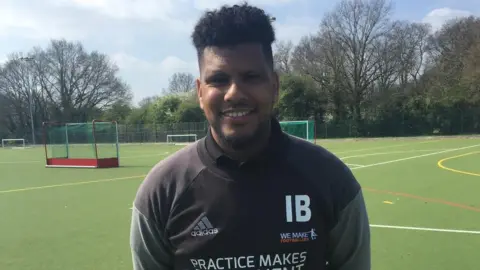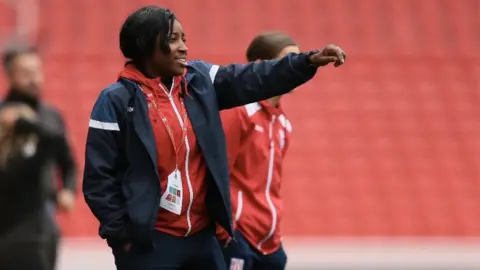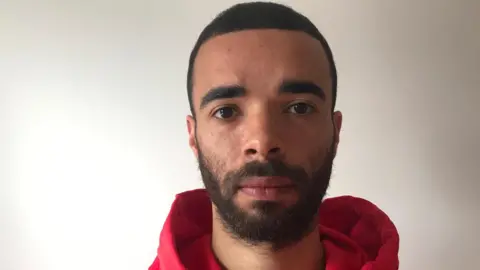Black football coaches: What holds us back
 Luri, Alena, Levi
Luri, Alena, LeviRaheem Sterling says there are not enough black managers for young football fans to aspire to.
He's got a point. There are currently only six black or non-white head coaches in the top 92 clubs in the English professional leagues.
In 2018, the Football Association announced a plan to increase the 5% of its leadership roles and 13% of England coaching staff that are currently filled by people from a BAME background.
There are around 500 players in the 20 Premier League squads. More than a quarter of those are black or mixed-race, but when they retire few are moving into senior management.
Iuri Baptista is a coach based in West London, who says at grass roots level you tend to see a mixture of BAME coaches but "as you progress towards academy you start to see fewer".
 Luri Baptista
Luri BaptistaThe FA has set a target for 20% of the England team's coaching staff to be from a BAME background by the end of 2021.
'Hard to speak up'
Iuri thinks it's hard for coaches like him to aspire to be in the top leagues. If there are no black coaches in the top flight, sometimes it's "hard to speak up".
"You get put in predicaments where you want to argue your point, but don't want to overstep the boundaries and come across as unprofessional," he tells Radio 1 Newsbeat.
In the UK almost 14% of the population are from a BAME background and Iuri wants that better reflected in coaching.
Iuri isn't keen on positive discrimination or "special treatment" for people from underrepresented backgrounds.
"We just want to be given the same opportunities and see the same type of representation across the board," he says.

Alena Moulton is coach of Stoke City Women. Originally from Derby the determined 29-year-old has worked herself up to the top tiers of the coaching game.
Alena only started in coaching in her late teens, volunteering at grass roots level, while she was looking for a job.
She says she now "feels valued as a coach" at Stoke City but sees the combination of being female and black as a different issue to representation in league clubs.
"The generalisation with BAME is male. Sometimes there is a thought that if you tick that box it's ok," she tells Newsbeat.
'I am one of those role models'
Alena says initiatives for change have been focused on getting black male coaches in a professional environment but black females have missed out. Now the Stoke City boss wants to see a real pathway to get to the top.
"On the male side they are encouraged to get onto courses and we must continue to highlight those female role models," she says.
And the signs over the past 12 months have been encouraging.
"The clubs are now more appreciative of what everyone brings.
"I understand that I am one of those role models and we are trying to reach out and say this is something you can get into".

Levi Desouza, a volunteer coach at Leicester Nirvana, says he's struggled to get jobs higher up the coaching ladder - and he can't understand why.
"I'm not trying to pull a race card or anything, but I've applied to clubs around Leicester. It's questionable why it's been overlooked".
In 2019, UK football introduced the The Rooney Rule which means English Football League clubs must interview at least one black, Asian or minority ethnic candidate when searching for a new first-team manager.
The rule though does not include the Premier League, who say they are pushing other initiatives.
"I have my doubts this will bring black coaches into the game", says Levi, who wants the scheme adapted and has a clear plan on how he'd like that done.
"They need to discuss why they are being overlooked".
'Brave enough to talk about issues'
Levi believes someone at the FA should ask for feedback on why a BAME candidate didn't get a job and working with unsuccessful candidates to fix the issue.
He asks: "Sol Campbell, he's been to numerous interviews. Is he bad at interviews?"
Like Alena, Levi has seen some positive change in the past 12 months for BAME coaches.
"Raheem Sterling has just done so much to push it. He's been a role model. Hats off to everything he's doing," he says.
Sterling wants more black, Asian and minority ethnic representation among administrators and coaching staff in British football, and says equal opportunities should be given to former BAME players.
"Raheem's brave enough to talk about the underlying issues in the game," says Levi.
He sees a change in approach from the media towards the story.
"What he is saying makes sense - you can't question the facts".


